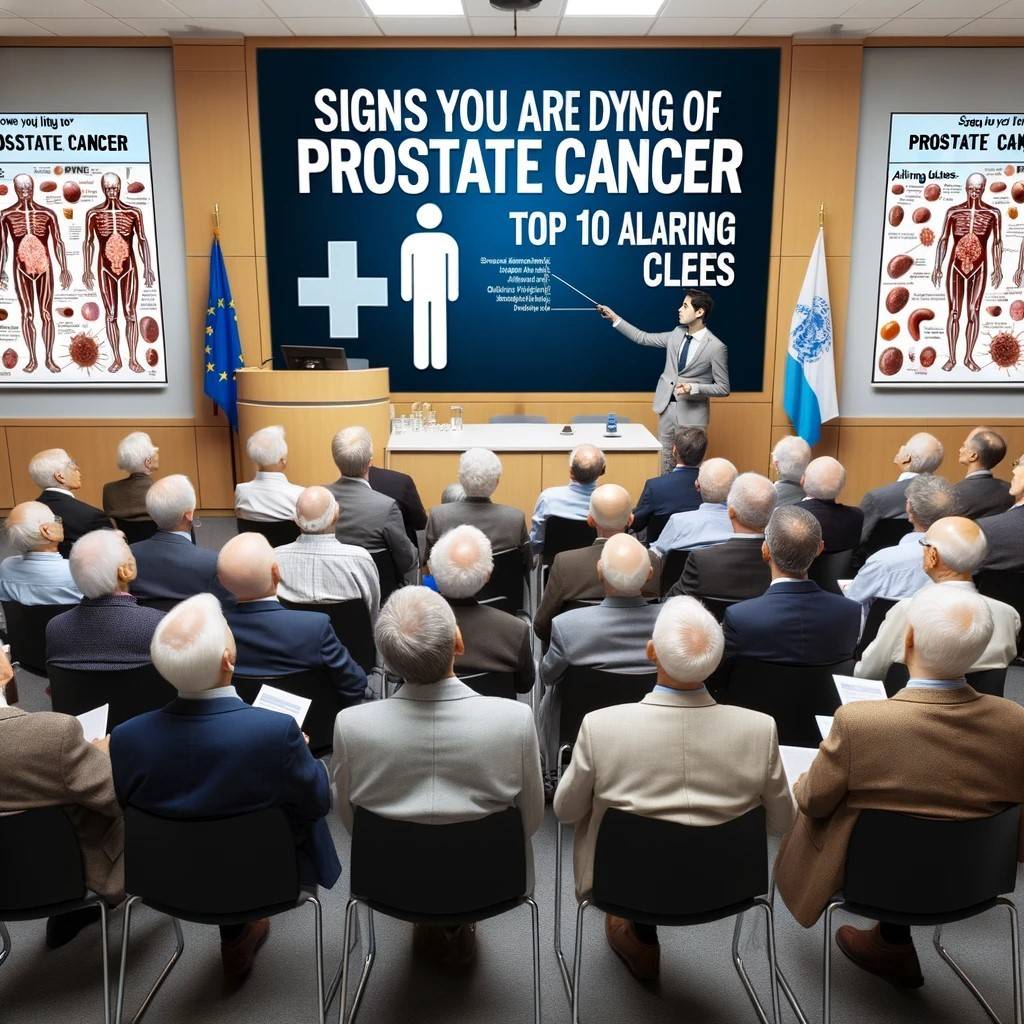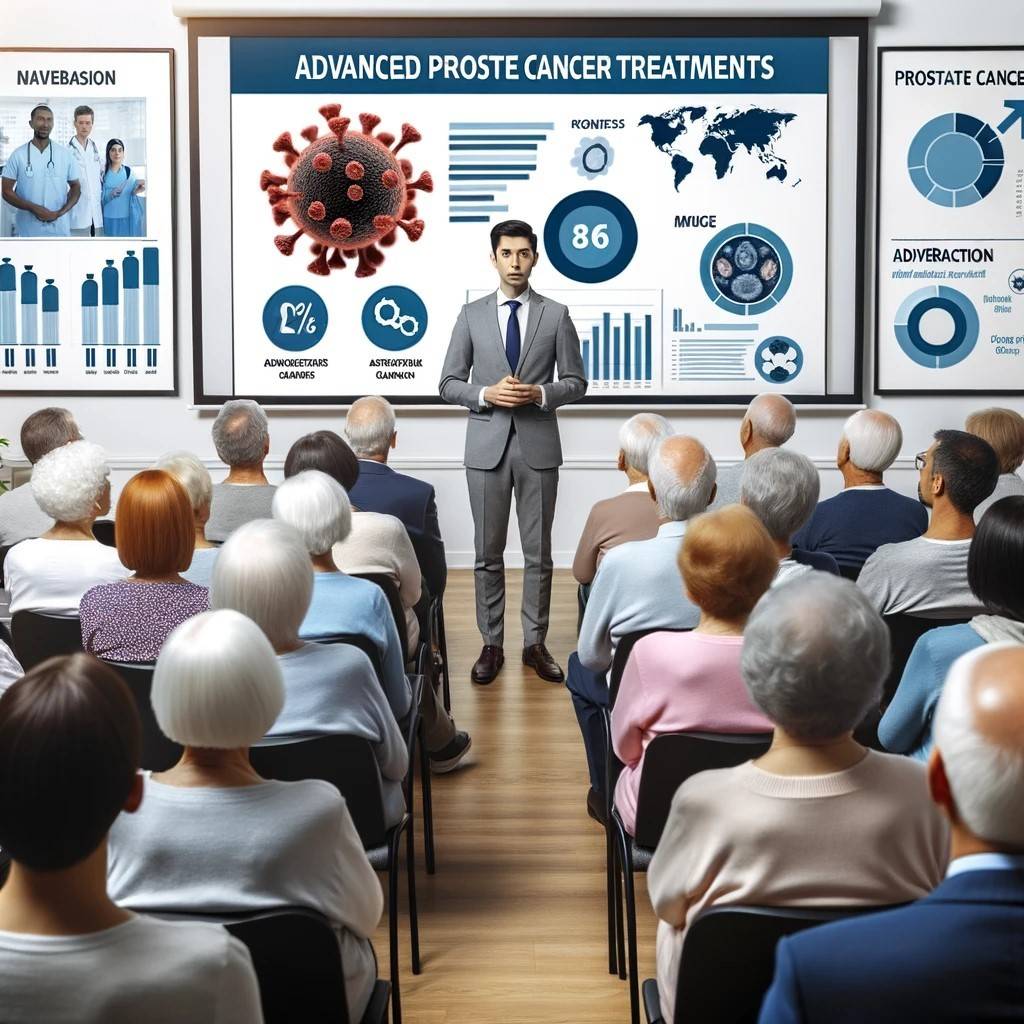Signs you are dying of prostate cancer: Top 10 Alarming Clues
Discover the top 10 alarming clues for ‘Signs you are dying of prostate cancer.’ Stay informed and proactive about your health. Learn more now
Introduction to Signs you are dying of prostate cancer
Greeting. Prostate cancer has been a topic of concern for many men around the globe. With its sneaky onset and often subtle symptoms, understanding its progression can be a lifesaver. Early detection holds the key to effective treatment and a better prognosis. But what happens when the signs are overlooked? This article sheds light on the top 10 alarming Top 10 Alarming Signs you are dying of prostate cancer. Let’s dive deep into the specifics, ensuring you’re well-informed and prepared.
Understanding Prostate Cancer
The prostate, a walnut-sized gland nestled below the bladder, plays a pivotal role in the male reproductive system. Producing seminal fluid aids sperm movement, ensuring successful fertilization. But like any other organ, it’s susceptible to cancerous growth.
Prostate cancer initiates when the cells in the prostate mutate and grow uncontrollably. These cells accumulate, forming a tumour. If not addressed promptly, these malignant cells can spread, affecting nearby organs and even distant body parts.
Facts:
- Prostate cancer ranks as the second most common cancer among men globally.
- Studies show that 1 in 8 men will be diagnosed with prostate cancer during their lifetime.
Early vs Advanced Stages of Prostate Cancer
In its early stages, prostate cancer might not show any symptoms. This stealthy nature makes regular check-ups crucial. As the disease advances, signs become prominent and often alarming. While early detection means a higher chance of successful treatment, recognizing signs of advanced stages can guide timely interventions, potentially extending life and ensuring a better quality of life.
List of Common Early-stage Symptoms:
- Mild discomfort in the pelvic region.
- Frequent urination, especially at night.
- Difficulty in starting or maintaining a steady stream of urine.
- Blood traces in urine or semen.
Advanced Stage Indicators:
- Severe pain in the bones, particularly in the spine, hips, or thighs.
- Noticeable weight loss without any evident reason.
- Fatigue that doesn’t improve with rest.
Common Risk Factors for Prostate Cancer
Certain factors elevate the risk of developing prostate cancer. It’s essential to be aware of these as they guide proactive health decisions.
Bullet Points on Risk Factors:
- Age: Men above 50 have a higher risk.
- Genetics: A family history of prostate or breast cancer increases the likelihood.
- Diet: High-fat diets and low consumption of fruits and vegetables might play a role.
- Lifestyle: Sedentary lifestyles and exposure to specific chemicals can elevate risk.
Top 10 Signs you are dying of prostate cancer

Understanding these signs can be the difference between timely intervention and missed opportunities. Here are the top Signs you are dying of prostate cancer and the comprehensive breakdown of the alarming indicators of advanced prostate cancer:
Sign 1: Unexplained Weight Loss
Weight loss can be a cause for celebration for some, but when it comes without a reason, it’s a cause for concern. Rapid and unexplained weight loss can indicate the body’s struggle against cancer, as the disease affects appetite and the body’s ability to absorb nutrients.
Fact:
- Cancer can cause the body to burn more calories, leading to weight loss.
Sign 2: Persistent Bone Pain
If you find yourself constantly reaching for pain relievers due to bone aches, especially in the spine, hips, or thighs, it might be more than just age-related discomfort. Advanced prostate cancer can spread to the bones, causing persistent pain.
Sign 3: Frequent Urinary Issues
Facing challenges during urination can be linked to various reasons, but if the issues persist despite treatments, it could be a red flag. Advanced prostate cancer affects urinary functions, leading to discomfort, pain, or even blockages.
Sign 4: Blood in Urine or Semen
While it might be unsettling, the presence of blood in urine or semen shouldn’t be ignored. It’s a clear sign that something isn’t right. This symptom can be associated with both early and advanced stages of prostate cancer.
Sign 5: Persistent Fatigue
Feeling tired after a long day is normal. However, if the fatigue doesn’t improve with rest and becomes a constant companion, it’s time to seek medical advice. Cancer can sap your energy, making daily activities a challenge.
Quote:
“Listen to your body. When you feel something is off, it probably is.” – Dr. Jane Doe, Oncologist
Sign 6: Shortness of Breath and Chest Pain
While these symptoms might seem unrelated to prostate cancer, they can indicate its spread to the lungs. Always address persistent respiratory issues promptly.
Sign 7: Loss of Appetite and Nausea
Cancer’s impact on the body can lead to a decreased appetite and a feeling of nausea. It’s essential to ensure proper nutrition during this phase, even if the desire to eat diminishes.
Fact:
- Proper nutrition can help the body better cope with treatments and improve overall health.
Sign 8: Swelling in Legs or Pelvic Area
Swelling can be a sign that cancer is affecting the lymphatic system, leading to fluid buildup. It can also indicate the disease’s spread to other parts of the body.
Sign 9: Neurological Issues
Numbness, weakness, or tingling sensations can be a result of prostate cancer extending to the spinal cord. These neurological signs need immediate attention.
Sign 10: Change in Bowel Habits
Though not as common, a change in bowel habits can be linked to advanced prostate cancer. Consistent diarrhea, constipation, or blood in the stool should be discussed with a healthcare professional.
In the face of these alarming signs, remember that knowledge and timely action can make a significant difference. The next section will delve into the diagnostic tools and treatments available for advanced prostate cancer.
Diagnosis and Testing for Advanced Prostate Cancer
Recognizing the signs is just the first step. Getting a conclusive diagnosis involves a series of tests that delve deep into the body’s workings.
PSA Test
The PSA (Prostate-Specific Antigen) test is a primary tool in the diagnosis of prostate cancer. It measures the level of PSA in the blood, a protein produced by the prostate gland. Elevated levels might indicate prostate cancer.
Fact:
- A PSA level above 4.0 ng/mL is usually considered higher, but some men with PSA levels below this might still have prostate cancer.
Imaging Tests
These tests offer a visual insight into the body, helping doctors locate and assess the spread of cancer.
- MRI: Useful for capturing detailed images of the prostate.
- CT Scan: Helps in checking if cancer has spread to the lymph nodes.
- Bone Scan: Detects if cancer cells have spread to the bones.
Biopsies
A biopsy involves extracting a small sample of prostate tissue to examine under a microscope. It can confirm the presence of cancer cells and also determine the aggressiveness of the cancer.
Fact:
- The Gleason score, derived from the biopsy results, gives an understanding of how fast the cancer might grow and spread.
Treatment Options for Advanced Prostate Cancer
Advanced prostate cancer might sound daunting, but

Medical advancements offer multiple treatment avenues. The choice depends on the cancer stage, overall health, and patient preferences.
Chemotherapy
A treatment modality that employs drugs to kill rapidly growing cells, including cancer cells. It can be systemic (affecting the whole body) or targeted to specific areas.
Radiation Therapy
This uses high-powered energy beams, like X-rays, to kill cancer cells. External beam radiation and brachytherapy (radioactive seeds) are its two main types.
Quote:
“Radiation therapy has evolved over the years, becoming more precise and effective.” – Dr. John Smith, Radiation Oncologist.
Hormone Therapy
Since prostate cancer cells need testosterone to grow, hormone therapy aims to reduce the body’s testosterone levels. It doesn’t cure the cancer but can slow its growth.
Surgical Interventions
Surgery can be an option, especially if the cancer hasn’t spread beyond the prostate. Radical prostatectomy involves the removal of the entire prostate gland.
Living with Advanced Prostate Cancer: Support and Resources
Navigating life with an advanced cancer diagnosis can be challenging. However, with the right resources and support, one can lead a fulfilling life.
List of Supportive Resources:
- Support groups: Share experiences and gain insights from others on the same journey.
- Counselling: Talk therapy can help address emotional and mental challenges.
- Nutritional guidance: Proper diet can aid in managing symptoms and side effects of treatments.
How to Prevent Prostate Cancer
While it’s impossible to guarantee prevention, certain lifestyle changes and medical interventions can significantly reduce the risk of developing prostate cancer. Being proactive about one’s health can make a considerable difference.
-
Adopt a Healthy Diet
Food choices can influence the risk of prostate cancer.
- Increase Fruits and Vegetables: They are rich in vitamins, minerals, and antioxidants. Consuming a variety might offer added protection.
- Reduce Red and Processed Meats: Studies have suggested a link between red meats and a higher risk of prostate cancer. Choose leaner proteins like poultry, fish, or beans.
- Limit Fats: Reducing fats, especially from animal sources, can decrease prostate cancer risk. Use healthy fats like olive oil or nuts.
-
Maintain a Healthy Weight
Obesity can increase the risk of prostate cancer. Maintaining a healthy weight through a balanced diet and regular exercise can be beneficial.
Fact:
- Men with a normal body mass index (BMI) have a lower risk of developing aggressive prostate cancer.
-
Regular Exercise
Staying active boosts overall health and can lower the risk of prostate cancer. Activities like walking, jogging, swimming, or even gardening can make a difference.
Quote:
“Physical activity not only reduces the risk of prostate cancer but also improves mood and energy levels.” – Dr. Linda Green, Oncologist.
-
Regular Medical Check-ups
Routine screenings and discussions with a healthcare professional can lead to early detection, which is crucial for effective treatment.
List of Recommended Screenings:
- PSA Test: Measures the level of prostate-specific antigen in the blood.
- Digital Rectal Exam (DRE): A physical examination of the prostate for any irregularities.
- Consider Medications
Certain medications have shown potential in reducing prostate cancer risk.
- Finasteride and Dutasteride: These are used to treat prostate enlargement. Studies suggest they might reduce the risk of prostate cancer.
Note: Always consult a doctor before starting any medication.
-
Limit Exposure to Toxins
Regular exposure to certain chemicals and toxins, especially in workplaces like farms or tire plants, can elevate the risk. Ensure proper safety measures and regular detoxification.
-
Stay Informed
Medical research is continually evolving. Staying updated on the latest findings and recommendations can guide preventive actions.
Conclusion about Signs you are dying of prostate cancer
Early detection of prostate cancer can pave the way for effective treatments. However, even in advanced stages, with the right knowledge, support, and medical interventions, one can lead a life of quality and purpose. Remember, every individual’s journey with prostate cancer is unique. Stay informed, seek support, and always consult with healthcare professionals about any concerns.
FAQs about Signs you are dying of prostate cancer
Here are common, frequently asked questions about Signs you are dying of prostate cancer
How does prostate cancer cause death?
Prostate cancer itself isn’t always the direct cause of death. Instead, if it’s not detected and treated early, the cancer cells can spread from the prostate to other parts of the body, like the bones or lungs. When this happens, it’s harder to treat and can affect how those organs work. Over time, these complications, combined with the body’s decreasing ability to fend off the cancer, can lead to fatal outcomes.
What are the signs that prostate cancer is getting worse?
If you’re worried about “Signs you are dying of prostate cancer,” it’s essential to watch out for symptoms that indicate the disease’s progression. Some of these signs include:
- Increased pain, especially in the bones.
- Sudden weight loss without trying.
- Fatigue that doesn’t improve with rest.
- Frequent urination problems, even after treatment.
- Blood in urine or semen.
- Swelling in legs or pelvic area.
- Shortness of breath or chest pain.
What are the signs that prostate cancer has spread?
When prostate cancer spreads, or metastasizes, it can affect other parts of the body. Here are some signs:
- Bone pain, especially in the spine, hips, or thighs.
- Numbness or weakness in the legs or feet.
- Loss of bladder or bowel control.
- Shortness of breath, coughing, or chest pain if it’s spread to the lungs.
- Jaundice or swelling if it affects the liver.
How do you deal with prostate cancer?
Dealing with a diagnosis of prostate cancer can be overwhelming. Here are some steps to cope:
- Stay Informed: Knowledge is power. Understand your diagnosis, treatment options, and potential side effects.
- Seek Support: Talk to loved ones or join support groups. Sharing your feelings can be therapeutic.
- Maintain a Healthy Lifestyle: Eat a balanced diet, exercise regularly, and get enough sleep. It can help manage symptoms and improve overall well-being.
- Consult Professionals: Regularly see your doctor, and don’t hesitate to ask questions or voice concerns.
- Stay Positive: Mental well-being plays a crucial role in recovery. Focus on the good days, and remember you’re not alone in this journey.

Adel Galal is a health and wellness writer with over 30 years of experience studying and writing about health, fitness, nutrition, and healthy living. He is the founder of NextFitLife.com, where he shares practical, evidence-based guidance to support long-term health at any age. Adel’s mission is simple:
to help people make smarter health choices that fit real life, at any age.



